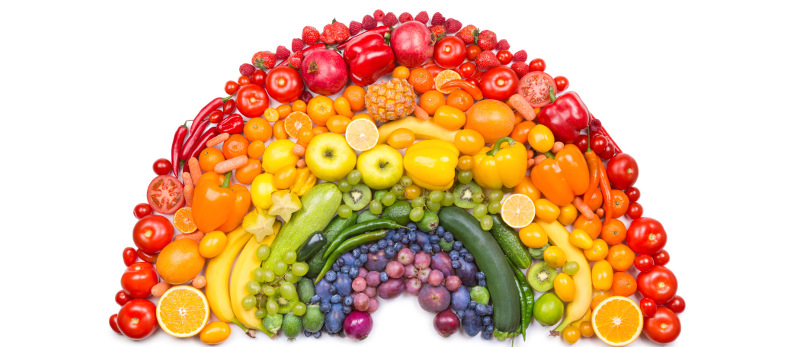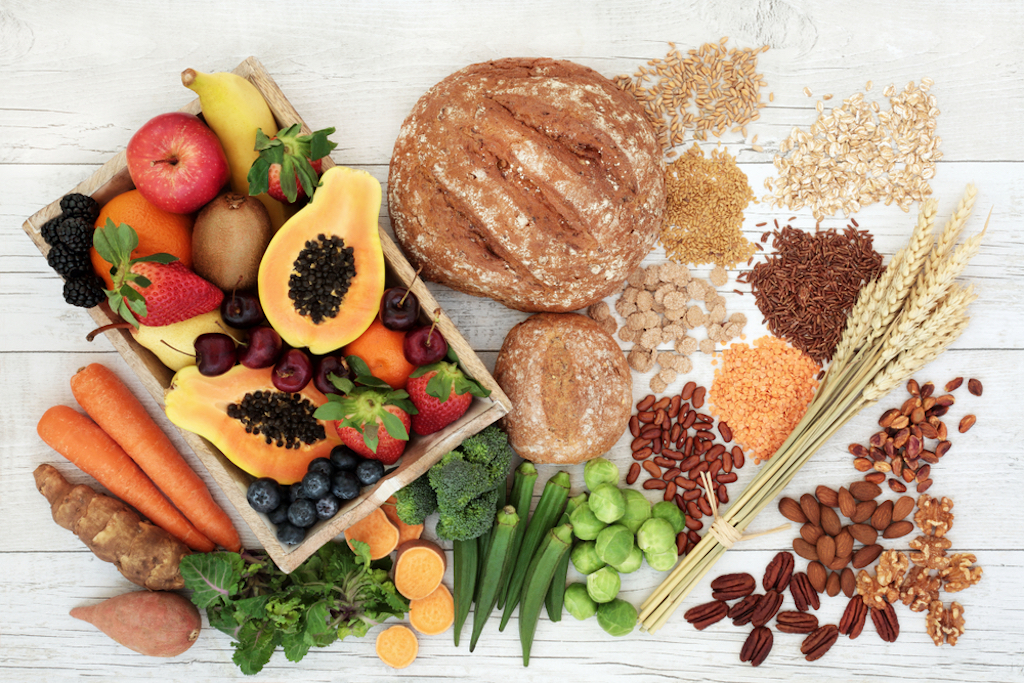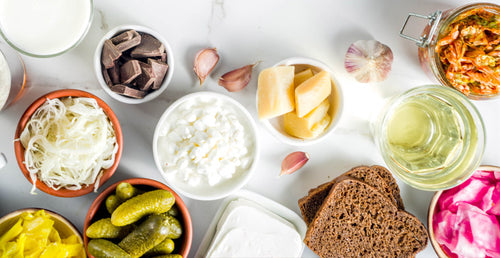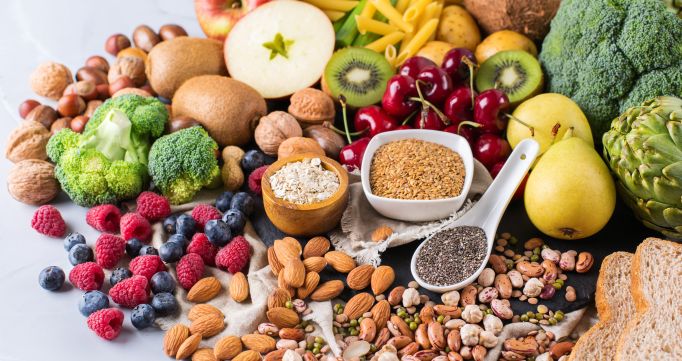Here's 5 nutrition hacks and their positive impact on your body, mind and soul.
The complexity and power of the body is fascinating, even some simple dietary interventions can make a big difference on your overall health, mental clarity, wellbeing, looks and performance.
You are what you eat
Everything we eat is broken down in our bodies and used to fuel, nourish and repair every single cell. We need to eat to provide our body with essential nutrients, vitamins and minerals that form the building blocks of our entire physiology and all our bodily functions impacting on how we feel, perform and how we look. In this way, we quite literally are made up of all the things we eat. But getting enough of these essential building blocks into our diet to give our body the opportunity to work at it’s optimum can be challenging.
Below you can find some tips and an insight into how implementing a few nutrition hacks or golden rules, as I like to call it, into your daily routine can have a substantial positive impact on a variety of conditions and bodily functions as well as supporting your body in staying fit, healthy and younger for longer.
1) Eat the colour of the rainbow
5-10 portions of fruit and vegetable a day - variety is key
One of the most simple tricks I advice every one of my clients to incorporate in their diet is to eat the rainbow which involves eating fruits and vegetables of different colours every day and aim for 5-10 in total. All vegetables and fruits contain health promoting vitamins, minerals and fibre but the colour is what makes them truly special. Different pigments, or phytonutrients give fruit and vegetable their colour, flavour and disease resistance and are linked to higher levels of specific nutrients and health benefits.
Phytonutrients act as powerful antioxidants in our bodies, protecting our cells from harmful substances known as free radicals that are generated as a natural byproduct of normal metabolism, accumulated from exposure to environmental toxins, or poor diet choices and certain conditions.
Diets rich in phytonutrients have been linked with lower risks of chronic illness, including dementia, heart disease, many different cancers and having a beneficial effect on ageing - yes, the ageing of the skin included!
While eating more vegetables and fruit is always a good idea, focusing on eating a variety of colours will increase your intake of different nutrients to benefit various areas of your health.

How to increase the variety of rainbow coloured fruit & veg:
Add the whole variety of colours of fruit and vegetable to your weekly shopping basket.
Try and include 2-3 different colours of vegetable or fruit to every meal.
Have a little list on the fridge door with all different sorts of fruit and vegetable in all colours, tick it off as the week goes by.
Smoothies - not only is it slightly easier to get our 5-10 a day of fruit and vegetable by incorporating smoothies into our routine but we can also have different coloured smoothies a few times a week ticking off those rainbow colours nicely.
Frozen fruit and vegetable are a great way to ensure you always have a variety at home while being equally nutritious and accessible.
2) Add more fibre
Fibre is the one thing that is lacking in so many of my client’s diets and evidence suggests most of us in the UK don’t consume the recommended 30g of fibre a day.
I believe this is driven by the modern avoidance of bread and reliance on to much processed foods and not enough diversity of vegetables and fruit.
But what is fibre and why is it so important?
Fibre is a type of carbohydrate that the body can’t digest. Though most carbohydrates are broken down into sugar molecules, fibre cannot be broken down and instead it passes through the body undigested.
The benefits of this process are numerous:
Better gut motility and regularity - enormously important for our body’s natural elimination of hormones, toxins and metabolic residues. Crucial in keeping our gut happy, feeding the good bacteria to keep the bad ones in check contributing to increased immunity.
Blood sugar regulation - including fibre in our meals reduces blood sugar spikes and helps with more consistent blood sugar levels, contributing to healthier hormone regulation, reduced inflammation a healthy weight management and overall cell health.
Helps to lower cholesterol - fibre can bind to cholesterol helping to transport it out of the body and reduce unhealthy levels.
Fills you up - fibre rich meals have shown to keep you fuller for longer and keeps your hunger at bay, supporting a healthy weight management
The overall effect on cell health and therefore immunity, skin health, energy levels, hormone balance and mental health are substantial and through these mechanisms above consuming fibre rich foods appears to reduce the risk of developing various conditions, including heart disease, diabetes and diverticular disease.
Fibre is found exclusively in plant foods such as fruit and vegetable, nuts and seeds as well as wholegrains, beans and lentils.

Tips for increasing your fibre intake:
Replace white bread, pasta, rice with wholegrain bread and pasta and brown rice.
Wholegrain cereals or even better, oats - leave them overnight covered with your choice of milk, in the fridge or have some porridge for breakfast - add some berries and seeds.
Switch your juice for a smoothie - balance of vegetable and fruit.
Snack on vegetable sticks with hummus, wholemeal cracker with some nut butters or a handful of nuts instead of crisps and chocolate bars.
Introduce beans, lentils and chickpeas. Great additions to salads and soups or mixed into a bolognese as well as a good and cheap substitute for meat in a curry.
Where possible leave the skin on vegetable and fruits for some extra fibre.
Some fibrous superstars - avocado, raspberries, chia seeds, blackberries and figs.
3) Pre and probiotics
Our body and especially our gut is host to trillions of bacteria, virus and fungi that collectively make up the microbiome.
Some of these bacteria are associated with disease, however others are vital for various functions they carry out to keep the microbiome in balance and healthy and through this have a direct impact on additional factors such as your immune system (around 80% of our immune cells are located in the gut), your mental health, your ability to regulate weight, skin health and many other aspects of optimum wellbeing.
Signs of an imbalance gut microbiome can be:
Stomach disturbances like cramps, gas, bloating, constipation, diarrhoea, and heartburn
Skin problems like acne, eczema, sensitive or dry skin
Weight gain
Sleep and mood disturbances or constant fatigue
Autoimmune conditions or frequent infections
Food allergies and intolerances
Fertility issues
In order to stay healthy taking care of your microbiome, introducing and nourishing the good bacteria to be able to carry out all their functions and contributing to optimum health, there are some foods worth including into your diet on a regular basis.
Prebiotic foods can be seen as the ones that help feeding the already existing good bacteria whereas probiotic foods are adding beneficial bacteria directly into the mix.

How?
Try and include a spoonful of the below each day.
A spoonful of sauerkraut for example is a great addition to a salad or an avocado on toast and Kefir a nice replacement for yoghurt.
Prebiotic foods:
Leeks, garlic, chicory, green bananas, artichokes, onions, agave, asparagus, and Jerusalem artichokes, chickpeas, oats.
Probiotic foods:
kefir, fermented foods, sauerkraut, kimchi, tempeh, kombucha, miso.
4) Healthy fats - Omega 3
Omega 3’s are a group of polyunsaturated essential fatty acids, meaning our body cannot manufacture them and we must obtain them through the diet in adequate amounts for good health.
Healthy fats and especially Omega 3 fatty acids, specifically EPA and DHA nourish cellular membranes, they act with membrane proteins affecting the transport of substances into and out of the cell, modulate inflammation and are vital to good brain, hormone and immune health.
While other healthy fats or fatty acids like Omega 6 are also essential and beneficial there tend to be no shortage in most of my clients diets.
However it is important to maintain a beneficial ratio and balance to avoid contributing to inflammation in the body.
The easiest way to do this and even out the ratio, keeping it in the desired balance, is to include oily fish in your diet 2-3 times a week as well as reducing processed food.
Salmon, Mackerel, Anchovies, Sardines and Herring are good sources of oily fish and there are vegetarian options, too.
Flaxseed, chia seed and walnuts are the best sources, although they are not as potent in providing the same benefits and it is one of the areas that I do recommend to supplement in form of an algae oil based supplement if you are on a vegetarian or vegan diet.

5) Hydrate
I’m sure you’ve heard it before but drinking enough water each day is crucial for maintaining optimal health and wellbeing for so many reasons.
Your body uses water to remove waste, regulate temperature, keep joints lubricated and deliver nutrients to and into every cell.
Every cell, tissue, and organ in your body needs water to work properly.
Being well-hydrated also improves sleep quality, cognition, and mood.
And did you know that often when we think we feel hungry our body is in fact asking to be hydrated?
To stay sufficiently hydrated 2L is a good bench mark but will differ with activity levels.
In clinic I find that a lot of my clients only drink a few glasses of water and sometimes struggle to increase the amount. But not all of it has to come from plain water; for example, some can come from water flavoured with fruit or vegetables (lemons, berries, or orange or cucumber slices), or from herbal teas, juices etc.

Tips for increasing your water intake:
Keep a water bottle with you during the day.
Add some flavour to it.
Drink a large glass of water first thing in the morning.
Have a couple of herbal teas during the day.
Drink water before, during and after a work out.
Of course we are all individuals and each person is entirely unique.
Any personal advice and tailored nutrition can be built from a thorough health analysis and consultation with me in The Wellness Clinic at Cloud Twelve where we can dive deeper into how to address certain conditions or optimise your individual health.
Britta Heubeck | Registered Nutritional Therapist
DipNT mBANT rCNHC
Tags: Health, Wellness, Tips, Nutrition, Diet, Food | Author: Britta Heubeck, Registered Nutritional Therapist







